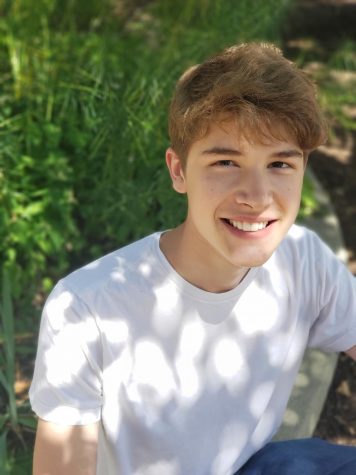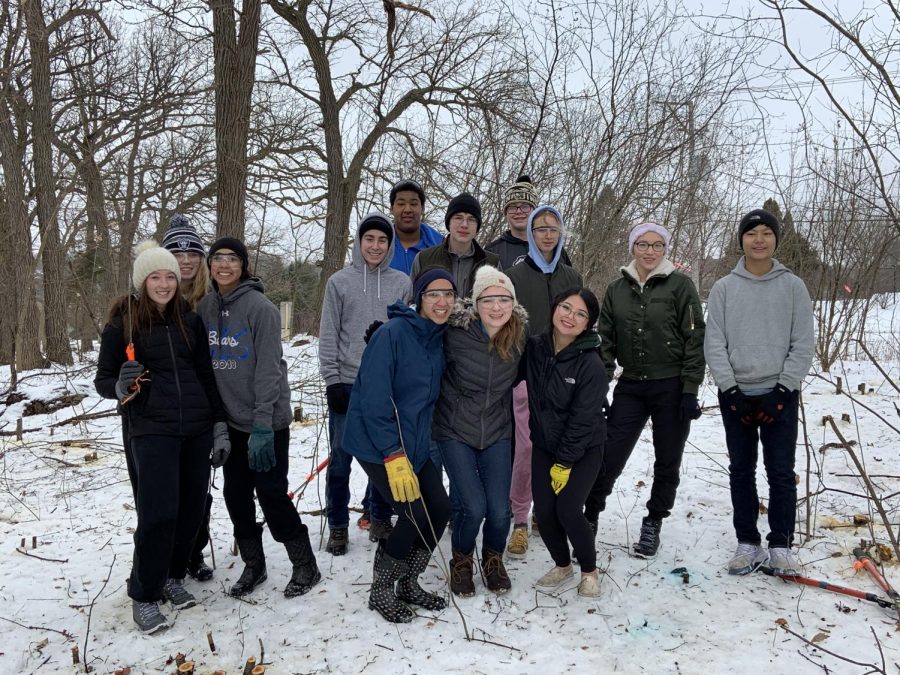Saved by the axe
REACT club cuts out invasive species
On the edge of the lower lot, an unsuspected tragedy was unfolding.
In a nearby woodland strewn with garbage and suffocated with invasive species, one group of students decided to create a change of scenery. A pristine acre of oak trees was being choked out by invasive buckthorn, which was the main motivation for Paige Orals, senior REACT Club president, to start an unprecedented project.
“So many ecosystems and areas around the country and Illinois are really impacted by invasive species, and it really degrades the ecosystem,” Orals said. “So I think it’s really helpful to remove those invasives and just to restore places back to the original state in order to reduce the footprint of those invasive species.”
That motivation to tackle the issue of invasive species brought Orals to an internship at the Ancient Oaks Foundation, Orals said. Orals was able to not only learn about how to clear these invasive species but also met new people like Judi Thode, president of the Ancient Oaks Foundation, who pointed out the wooded area in the first place, says Orals.
Thode, whose organization clears invasive species in the area, says the main reason to clear these invasive is to preserve the oaks. According to Thode, an oak tree in our area “supports well over 500 hundred different species of plants animals, fungi, moles, anything that belongs here. So when oak trees go, we lose those 500 species that it supports, and we lose huge biodiversity.”
In order to preserve those oak trees, Orals says the REACT club, along with other student organizations like NHS, teamed up with Ancient Oaks to clear the invasive buckthorn. But those were not the only organizations that helped bring the project to completion.
Ela Township and the school administration helped dispose of the buckthorn, according to Julie Gyarmaty, AP Environmental Science teacher and REACT sponsor. While the project may have been daunting, Orals says the help from these organizations and over 25 volunteers helped keep the work going at a steady pace.
“I expected it would take a long time, it’s a big plot of land and a lot of trees and because we couldn’t use any power saws or anything, you know it was definitely a big project. I think it was great that we got so many volunteers so many other clubs and they really helped us get it done fast too.”
The efficiency from having so many volunteers shows how powerful students can be when they unite, Orals said. Not only did this cooperation bring effective teamwork, but the project also “educated students from other clubs about invasive species, so they might have a different take on the environment after volunteering and seeing their work paid off,” Orals said.
Clearing out these invasives does not just educate students and make them more aware, Thode says. After clearing the area of invasives, Thode says, there are more opportunities for life to grow and prosper, which would make anyone feel a sense of accomplishment and empowerment.
“You get an awesome feeling [after clearing invasives]. And there’s always more work that needs to be done with the weeding and so on. But it’s a great feeling, knowing that future generations will be able to enjoy the beauty and grandeur of the oak, it’s a great feeling to know that wildlife now has a decent place to go, to hang out to eat, to reproduce, to be what they’re supposed to be out in nature,” Thode says. “It’s not a big area, but it will be much more usable for everyone and everything now.”
Seeing the impact of clearing and how much more useful the area will be inspired students to take pride in their work, Gyarmaty said. The project proved that real change could happen from student activism and volunteering, said Gyarmaty.
“It was really rewarding to see how much work the students did, and how other people in the school noticed the improvement being made. This was a perfect example of that kind of project where students were enthused, because actually doing something to help the environment was very rewarding for them,” Gyarmaty said. “When you can translate your [passion] into something positive for the community and the school, it makes it a whole lot more meaningful. It’s important for students to want to be active, and it just shows how much they can really accomplish when they put their minds to it.”

As a senior, this is Max’s third year on staff and first year as magazine editor in chief for the Bear Facts program. He aspires to study environmental...

